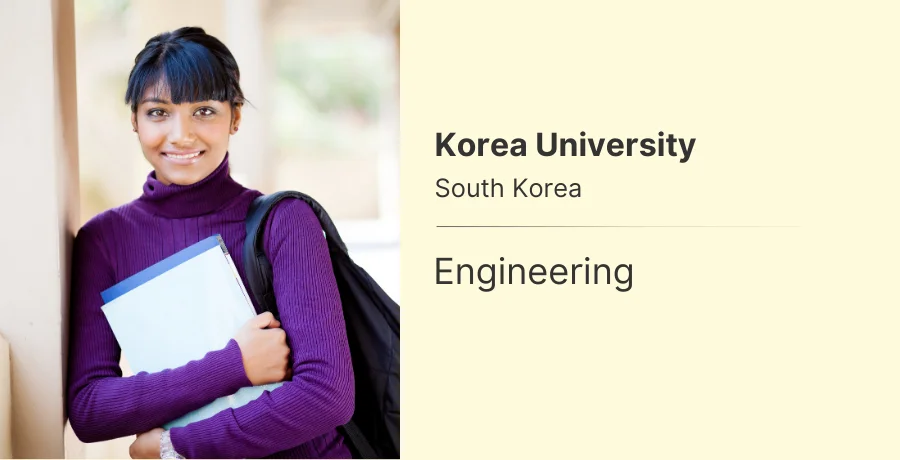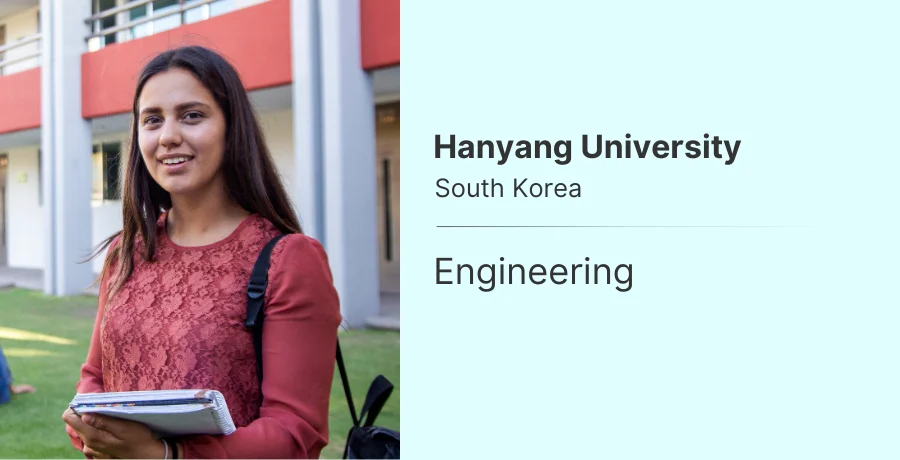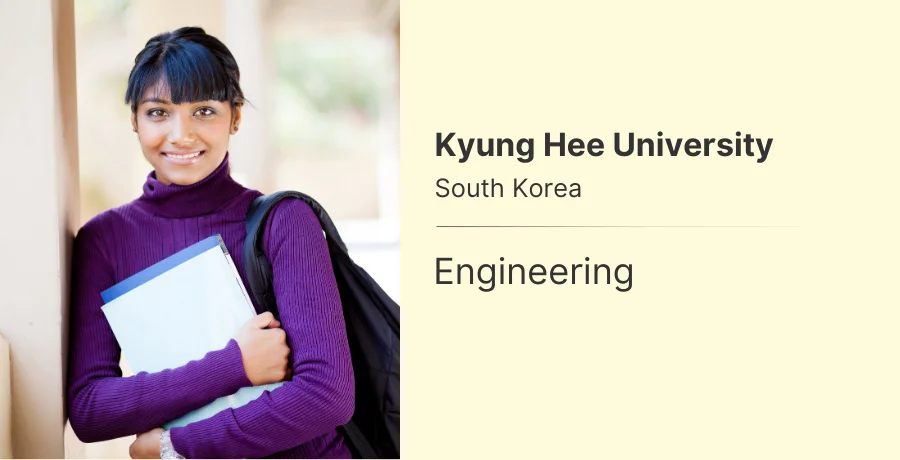Table of Contents
- Engineering at KAIST - Highlights
- Why Study Engineering at KAIST?
- KAIST Engineering Rankings
- KAIST Engineering Acceptance Rate
- Popular Engineering Courses at KAIST
- Admission Requirements to Engineering at KAIST
- Cost of Engineering at KAIST for Indian Students
- Scholarships at KAIST
- Job Prospects for Engineering at South Korea
- FAQs – Engineering at KAIST
Engineering at KAIST - Highlights
KAIST (Korea Advanced Institute of Science and Technology) in South Korea is renowned for its cutting-edge engineering programs. Located in the vibrant city of Daejeon, KAIST offers a unique blend of academic excellence and cultural richness. With state-of-the-art facilities and a focus on research and innovation, KAIST provides an ideal environment for aspiring engineers.
The engineering courses at KAIST are designed to equip students with practical skills and theoretical knowledge, preparing them for successful careers in various engineering fields. The institute's strong industry connections and emphasis on hands-on learning ensure that graduates are well-prepared to tackle real-world challenges.
Why Study Engineering at KAIST?
Studying engineering at KAIST offers numerous advantages, including access to world-class faculty, cutting-edge research opportunities, and a dynamic learning environment. The institute's commitment to fostering innovation and critical thinking ensures that students are well-equipped to contribute to the global engineering community.
- Access to state-of-the-art facilities and labs
- Strong industry connections and internship opportunities
- International collaborations and exchange programs
- Emphasis on hands-on learning and real-world applications
KAIST Engineering Rankings
| Ranking Authority | Ranking |
|---|---|
| US News and World Report | Top 50 |
| QS World University Rankings | Top 30 |
| THE World University Rankings | Top 40 |
| ARWU Rankings | Top 100 |
KAIST Engineering Acceptance Rate
- The acceptance rate for engineering programs at KAIST is highly competitive, typically around 10-15%.
- KAIST looks for students with exceptional academic records, strong recommendations, and a passion for engineering.
Popular Engineering Courses at KAIST
- Top Bachelor's Programs:
- Mechanical Engineering: Focuses on the design, analysis, and manufacturing of mechanical systems.
- Electrical Engineering: Covers electrical systems, circuits, and power electronics, preparing students for diverse careers.
- Top Master's Programs:
- Computer Science and Engineering: Emphasizes advanced computing techniques, algorithms, and software development.
- Civil and Environmental Engineering: Focuses on sustainable infrastructure development and environmental protection.
Admission Requirements to Engineering at KAIST
Admission to the engineering programs at KAIST is highly competitive and requires a strong academic background and a passion for engineering.
- Entry Requirements:
- KAIST Engineering entrance exam
- KAIST Engineering entry requirements
- Eligibility Criteria:
Applicants must have a high school diploma or equivalent with excellent academic records. Proficiency in English or Korean is required, depending on the language of instruction.
International students are encouraged to apply, provided they meet the academic and language requirements.
- Documents Required:
- Completed application form
- High school transcripts
- Recommendation letters
- Statement of purpose
- English/Korean proficiency test scores
- Proficiency Test:
Applicants must submit scores from recognized English proficiency tests such as TOEFL or IELTS. For programs taught in Korean, TOPIK scores may be required.
- Visa Process:
- Obtain an admission letter from KAIST
- Apply for a student visa (D-2) at the nearest South Korean embassy or consulate
- Submit required documents, including passport, admission letter, and financial proof
- Attend a visa interview if required
Cost of Engineering at KAIST for Indian Students
- Tuition Fees:
The tuition fees for engineering programs at KAIST are approximately $6,000 to $8,000 per semester, depending on the program and level of study.
- Cost of Living:
The cost of living for students in Daejeon, South Korea, is around $500 to $700 per month, covering accommodation, food, and other expenses.
| Expense | Approximate Cost (per month) |
|---|---|
| Accommodation | $200 - $300 |
| Food | $150 - $250 |
| Transportation | $50 - $100 |
| Miscellaneous | $100 - $150 |
Scholarships at KAIST
KAIST offers various scholarships to support international students in their academic pursuits.
- KAIST International Student Scholarship: Covers full tuition fees, living expenses, and medical insurance.
- KAIST Presidential Scholarship: Awarded to top-performing students, covering tuition and living expenses.
- External Scholarships: Various government and private scholarships are available for international students.
Job Prospects for Engineering in South Korea
- Graduates of KAIST's engineering programs have excellent job prospects in South Korea and globally.
- Job opportunities include positions in leading tech companies, research institutions, and academia.
| Job Title | Average Salary (per annum) |
|---|---|
| Software Engineer | $50,000 - $80,000 |
| Mechanical Engineer | $45,000 - $70,000 |
| Civil Engineer | $40,000 - $65,000 |
| Electrical Engineer | $50,000 - $75,000 |
FAQs – Engineering at KAIST
- Can I work while studying engineering at KAIST?
Yes, international students can work part-time during their studies, but there are restrictions on the number of hours. It is recommended to check the latest regulations from the South Korean government.
- What are the advantages of studying engineering at KAIST?
Studying at KAIST provides access to world-class faculty, cutting-edge research opportunities, and strong industry connections. The institute's emphasis on innovation and practical learning prepares students for successful careers.
- What is the average salary for engineering graduates from KAIST?
The average salary for engineering graduates from KAIST ranges from $50,000 to $80,000 per annum, depending on the field and job role.
- What is the duration of engineering programs at KAIST?
Bachelor's programs typically take four years to complete, while master's programs take two years. Doctoral programs can take between three to five years.
- What exams are required for admission to KAIST's engineering programs?
Applicants need to take the KAIST entrance exam and may also need to submit scores from standardized tests such as the SAT, ACT, or GRE, depending on the program.
- What are the popular engineering courses at KAIST?
Popular courses include Mechanical Engineering, Electrical Engineering, Computer Science and Engineering, and Civil and Environmental Engineering.












